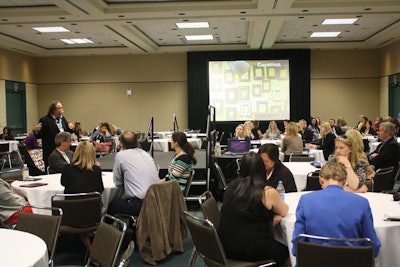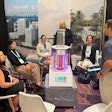
This week, thousands of planners and suppliers are attending the Professional Convention Management Association's annual meeting, Convening Leaders, at the Orange County Convention Center. The education program kicked off Monday, with one session dealing with how to create better sessions.
Jeff Hurt, executive vice president of education and engagement at Velvet Chainsaw Consulting, addressed a packed room on the benefits of content curation versus aggregation for conferences and trade shows. Hurt said it is critical that planners strategically select education session topics and speakers rather than leave those decisions to a volunteer committee or rely solely on a call-for-proposals.
“I do not know of a business model that exists in the for-profit world that allows a product or a service to be designed by volunteer committee members who have no accountability if the product fails. So why in the world do we do it in the nonprofit sector? And how do you know the content your committee selects will attract the right target market?” Hurt said.
This is particularly true for trade shows, where most of the event’s revenue comes from exhibitors, he said. Planners need to develop an education program that will attract the attendees exhibitors want, namely “economic buyers and the people who have decision-making authority.”
The process of becoming a curator starts by identifying those target markets and determining what content will solve their needs. “Don’t give me a conference evaluation that asks, 'What sessions do I want to see next year?' Ask me what problems I am dealing with,” Hurt said. After identifying those problems, planners can select content that provides solutions. “When you do a Google search, what you want is filtered information. You want relevance. Your attendees are looking to you to filter that content and base it on their wants and needs,” he said. Planners that still want to use a call-for-proposals system should structure it around a small number of themes that each relate back to attendees’ needs.
Only after the education topics have been selected should planners develop the schedule and begin identifying speakers. “Who has the expertise in our industry? Then you have to figure out, are they a decent speaker?” Hurt said. He also suggested that organizers analyze session evaluations immediately following each session, particularly if the speaker is scheduled later in the program, so the planner has time to offer coaching on how to improve the presentation.
“The focus should be on quality, not quantity,” he said. "Don’t try to be all things to all people."



















